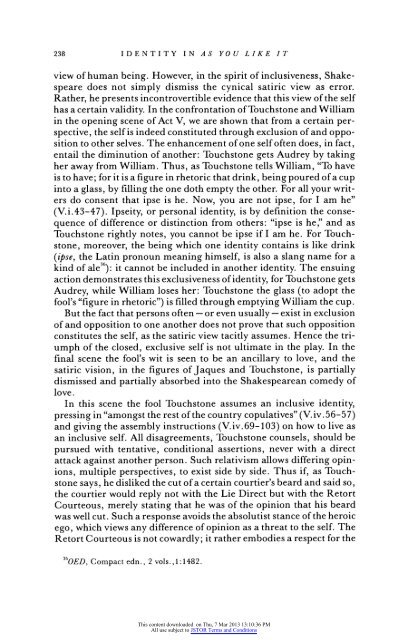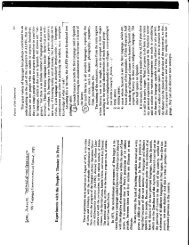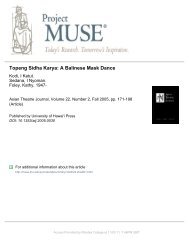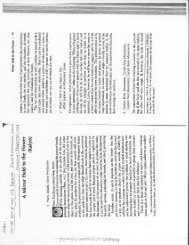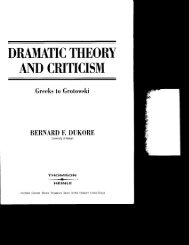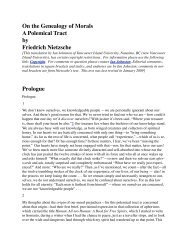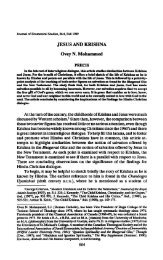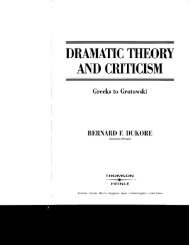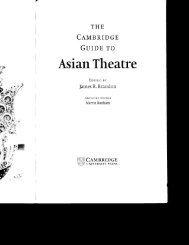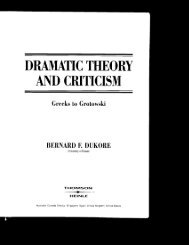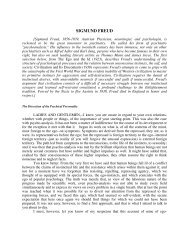Contrary Notions of Identity in As You like It - Yavanika
Contrary Notions of Identity in As You like It - Yavanika
Contrary Notions of Identity in As You like It - Yavanika
You also want an ePaper? Increase the reach of your titles
YUMPU automatically turns print PDFs into web optimized ePapers that Google loves.
238<br />
I D E N T I TY IN AS YOU LIKE IT<br />
view <strong>of</strong> human be<strong>in</strong>g. However, <strong>in</strong> the spirit <strong>of</strong> <strong>in</strong>clusiveness, Shakespeare<br />
does not simply dismiss the cynical satiric view as error.<br />
Rather, he presents <strong>in</strong>controvertible evidence that this view <strong>of</strong> the self<br />
has a certa<strong>in</strong> validity. In the confrontation <strong>of</strong> Touchstone and William<br />
<strong>in</strong> the open<strong>in</strong>g scene <strong>of</strong> Act V, we are shown that from a certa<strong>in</strong> perspective,<br />
the self is <strong>in</strong>deed constituted through exclusion <strong>of</strong> and opposition<br />
to other selves. The enhancement <strong>of</strong> one self <strong>of</strong>ten does, <strong>in</strong> fact,<br />
entail the dim<strong>in</strong>ution <strong>of</strong> another: Touchstone gets Audrey by tak<strong>in</strong>g<br />
her away from William. Thus, as Touchstone tells William, "To have<br />
is to have; for it is a figure <strong>in</strong> rhetoric that dr<strong>in</strong>k, be<strong>in</strong>g poured <strong>of</strong> a cup<br />
<strong>in</strong>to a glass, by fill<strong>in</strong>g the one doth empty the other. For all your writers<br />
do consent that ipse is he. Now, you are not ipse, for I am he"<br />
(V.i.43-47). Ipseity, or personal identity, is by def<strong>in</strong>ition the consequence<br />
<strong>of</strong> difference or dist<strong>in</strong>ction from others: "ipse is he," and as<br />
Touchstone rightly notes, you cannot be ipse if I am he. For Touchstone,<br />
moreover, the be<strong>in</strong>g which one identity conta<strong>in</strong>s is <strong>like</strong> dr<strong>in</strong>k<br />
(ipse, the Lat<strong>in</strong> pronoun mean<strong>in</strong>g himself, is also a slang name for a<br />
k<strong>in</strong>d <strong>of</strong> ale36): it cannot be <strong>in</strong>cluded <strong>in</strong> another identity. The ensu<strong>in</strong>g<br />
action demonstrates this exclusiveness <strong>of</strong> identity, for Touchstone gets<br />
Audrey, while William loses her: Touchstone the glass (to adopt the<br />
fool's "figure <strong>in</strong> rhetoric") is filled through empty<strong>in</strong>g William the cup.<br />
But the fact that persons <strong>of</strong>ten - or even usually - exist <strong>in</strong> exclusion<br />
<strong>of</strong> and opposition to one another does not prove that such opposition<br />
constitutes the self, as the satiric view tacitly assumes. Hence the triumph<br />
<strong>of</strong> the closed, exclusive self is not ultimate <strong>in</strong> the play. In the<br />
f<strong>in</strong>al scene the fool's wit is seen to be an ancillary to love, and the<br />
satiric vision, <strong>in</strong> the figures <strong>of</strong> Jaques and Touchstone, is partially<br />
dismissed and partially absorbed <strong>in</strong>to the Shakespearean comedy <strong>of</strong><br />
love.<br />
In this scene the fool Touchstone assumes an <strong>in</strong>clusive identity,<br />
press<strong>in</strong>g <strong>in</strong> "amongst the rest <strong>of</strong> the country copulatives" (V.iv.56-57)<br />
and giv<strong>in</strong>g the assembly <strong>in</strong>structions (V.iv.69-103) on how to live as<br />
an <strong>in</strong>clusive self. All disagreements, Touchstone counsels, should be<br />
pursued with tentative, conditional assertions, never with a direct<br />
attack aga<strong>in</strong>st another person. Such relativism allows differ<strong>in</strong>g op<strong>in</strong>ions,<br />
multiple perspectives, to exist side by side. Thus if, as Touchstone<br />
says, he dis<strong>like</strong>d the cut <strong>of</strong> a certa<strong>in</strong> courtier's beard and said so,<br />
the courtier would reply not with the Lie Direct but with the Retort<br />
Courteous, merely stat<strong>in</strong>g that he was <strong>of</strong> the op<strong>in</strong>ion that his beard<br />
was well cut. Such a response avoids the absolutist stance <strong>of</strong> the heroic<br />
ego, which views any difference <strong>of</strong> op<strong>in</strong>ion as a threat to the self. The<br />
Retort Courteous is not cowardly; it rather embodies a respect for the<br />
360ED, Compact edn., 2 vols.,l:1482.<br />
This content downloaded on Thu, 7 Mar 2013 13:10:36 PM<br />
All use subject to JSTOR Terms and Conditions


